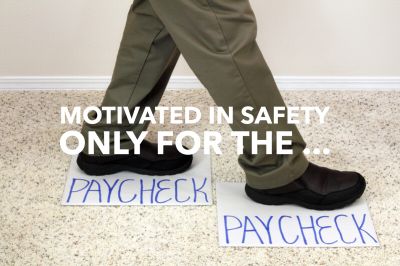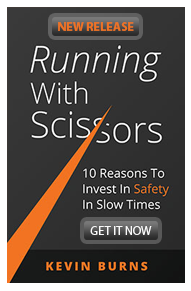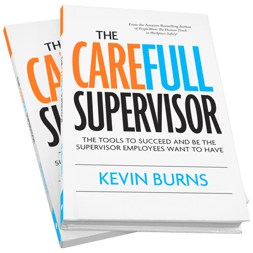When employees say that they’re in it for the paycheck, the other safety motivators are missing.
 A few years ago, a group of paper mill workers gathered in a community hall for a safety meeting. I was facilitating a safety leadership workshop that day. The conversation turned to motivation for safety. I asked the attendees to shout out reasons why the employees were motivated to work safely.
A few years ago, a group of paper mill workers gathered in a community hall for a safety meeting. I was facilitating a safety leadership workshop that day. The conversation turned to motivation for safety. I asked the attendees to shout out reasons why the employees were motivated to work safely.
First answer offered? Money talks. It seems that the employees were given a quarterly bonus for exceptional safety performance. Now, I disagree with cash incentives as motivation for increased safety performance. So I followed up asking that if the bonuses stopped, would they purposely engage in unsafe work? No one was willing to step forward and be anything but safe. We established that it wasn’t the money that motivated them to be safe. They agreed that money played only a small role in helping them to focus on safety.
Motivating Safety Beyond The Paycheck
So, what about the people who claim to be only in it for the money? The ones who say they only come to work for the paycheck? How do you get them motivated about safety?
Simple. Stop making them work for only the paycheck. OK, let’s back up and give that statement a little more credence. Here's some information to illustrate.
TINYpulse is a performance management tool used for ongoing surveys to 500 companies. TINYpulse measures employee engagement and organizational culture. In 2014 the tool was used to analyze some 200,000 anonymous survey responses.
What Employees Want From Their Work
According to the TINYpulse survey, the highest-rated factors that motivate employees to excel in their work and go the extra mile for their employer, include:
- Camaraderie, peer motivation
- Intrinsic desire to do a good job
- Feeling encouraged and recognized
- Having a real impact
- Growing professionally
- Meeting client/customer needs
- Money and benefits
- Positive supervisor/management
- Belief in the company
- Other
Notice where money and benefits are in the list: seventh. When employees tell you that they’re only in it for the paycheck, it’s because the six highest motivators are missing from their work.
What The List Means
Let’s start with the biggest one, peer motivation (item #1). Peers are an employee’s largest influence. It’s fellow workers who drive an employee’s motivation to deliver better (item #2). More than a supervisor or even money. People naturally want to fit in. If peers are working, they’ll get busy working. If peers are focused on safety, they’ll be focused on safety. Teammates motivate other teammates to go the extra mile and to want to look good in the eyes of their peers.
The biggest surprise in the TINYpulse survey was that only one in five employees felt valued at work. Four out of five did not. Seventy-nine percent feel either undervalued or marginally valued. When no one tells you that you’re doing a good job (item #3), even informally, it’s hard to feel any other way. Feeling undervalued directly affects motivation to make an impact (item #4).
When employees aren’t appreciated for their work, when the work lacks impact and growth opportunities (item #5), they resign themselves to working for the paycheck. Nothing else.
When you don’t give employees what they want, they focus on what they get. In the absence of the first six items on the list, the one they do get is money. That’s why they say they’re only in it for the money. They’re not getting anything else.
But the things they want don’t cost any money to give. They only take effort. It’s, unfortunately, an effort that supervisors and safety people are not giving employees.
Rules enforcement does not give employees encouragement, recognition, motivation, or upward growth potential. Employees don’t feel the job makes any sort of impact or that anyone else’s needs are being met. They don’t believe that supervisors and safety people are positive and upbeat. So, they lose faith and belief in the company. All that’s left is the paycheck.
What You Can Do
No amount of money can make up for a lack of the other motivating factors. As a supervisor and safety person, you have to change that. The rules enforcement model does not motivate. Period. Focus mostly on rules and procedure and you hurt motivation.
 You need a new skill-set, one that mentors and coaches good performance. One that encourages peers to recognize and encourage peers. Make them feel that their work means something and that they’re doing a good job. Give them opportunities to move up. Recognize your natural leaders. Empower them to become more autonomous in decision-making and in safety responsibility.
You need a new skill-set, one that mentors and coaches good performance. One that encourages peers to recognize and encourage peers. Make them feel that their work means something and that they’re doing a good job. Give them opportunities to move up. Recognize your natural leaders. Empower them to become more autonomous in decision-making and in safety responsibility.
If you don’t, you’d better have more money to give them.
Kevin Burns gives engaging, entertaining and inspiring presentations to front-line employees at safety meetings. He also works with supervisors and managers on-site or in keynote presentations at conferences. Kevin helps organizations integrate caring for and valuing employees through their safety programs. Kevin Burns is a management consultant, safety leadership speaker and author of 9 books. He is based in Calgary, Canada.
©2016 ZeroSpeak Corporation and Kevin Burns.
No part of this post may be reproduced without the expressed consent of the author.


